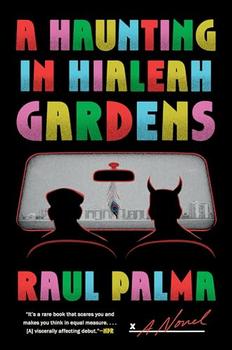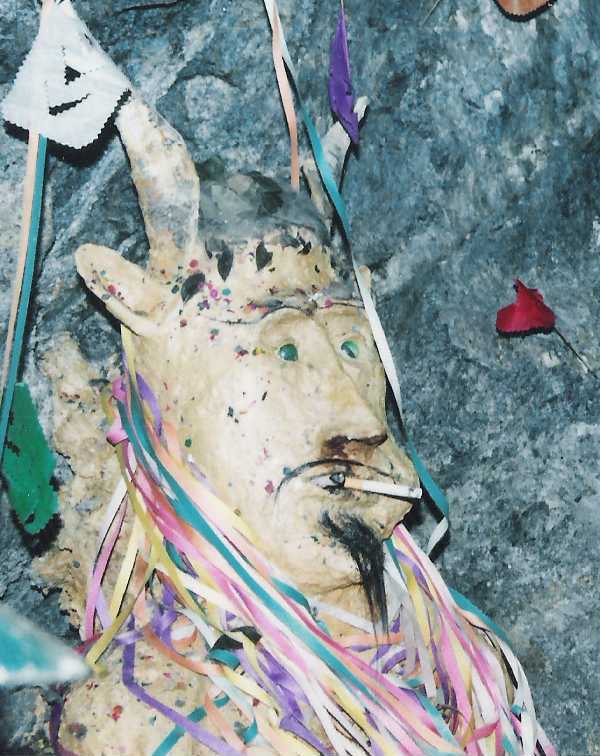Summary | Excerpt | Reading Guide | Reviews | Beyond the book | Read-Alikes | Genres & Themes | Author Bio

A Novel
by Raul PalmaA genre-bending debut with a fiercely political heart, A Haunting in Hialeah Gardens explores the weight of the devil's bargain, following the lengths one man will go to for the promise of freedom.
Hugo Contreras's world in Miami has shrunk. Since his wife died, Hugo's debt from her medical bills has become insurmountable. He shuffles between his efficiency apartment, La Carreta (his favorite place for a cafecito), and a botanica in a strip mall where he works as the resident babaláwo.
One day, Hugo's nemesis calls. Alexi Ramirez is a debt collector who has been hounding Hugo for years, and Hugo assumes this call is just more of the same. Except this time Alexi is calling because he needs spiritual help. His house is haunted. Alexi proposes a deal: If Hugo can successfully cleanse his home before Noche Buena, Alexi will forgive Hugo's debt. Hugo reluctantly accepts, but there's one issue: Despite being a babaláwo, he doesn't believe in spirits.
Hugo plans to do what he's done with dozens of clients before: use sleight of hand and amateur psychology to convince Alexi the spirits have departed. But when the job turns out to be more than Hugo bargained for, Hugo's old tricks don't work. Memories of his past—his childhood in the Bolivian silver mines and a fraught crossing into the United States as a boy—collide with Alexi's demons in an explosive climax.
Equal parts hilarious and heartbreaking, A Haunting in Hialeah Gardens explores questions of visibility, migration, and what we owe—to ourselves, our families, and our histories.
Hugo's individual story holds sufficient depth to feel complete unto itself. It would be easy for a reader to get lost in it alone, to forget that the setup of A Haunting in Hialeah Gardens practically promises a thrilling horror adventure. When it eventually delivers on this promise, it does so without seeming overstuffed or losing the thread of Hugo's character arc. His double-pronged problem of feeling both responsible and wronged is an issue inherent in a society where exploitation is the norm, where the philosophy required to justify this norm takes as much — possibly more — magical thinking to maintain as the superstitions that Hugo shuns but that even he understands serve a purpose. Palma's novel is an incisive social critique, a devastating portrait of self-sabotage, and a wild ride into the unknown that is still somehow oddly comforting in its inevitability...continued
Full Review
 (762 words)
(762 words)
(Reviewed by Elisabeth Cook).
 During the height of the Spanish colonization of Latin America in the 16th and early 17th centuries, conquistadors forced enslaved workers to extract vast amounts of silver from mines in Cerro Rico ("rich hill" in Spanish) near the city of Potosí (in what is now Bolivia), which once held the largest silver deposits on Earth. As many as eight million enslaved Quechan and African people died there. According to the Guardian, Cerro Rico "bankrolled Spain's colonial empire, the Spanish Armada and the European Renaissance." And it wasn't just that it provided currency; it created it. Author Jack Weatherford observes that Potosí was "the first city of capitalism … for it supplied the primary ingredient of capitalism – money,...
During the height of the Spanish colonization of Latin America in the 16th and early 17th centuries, conquistadors forced enslaved workers to extract vast amounts of silver from mines in Cerro Rico ("rich hill" in Spanish) near the city of Potosí (in what is now Bolivia), which once held the largest silver deposits on Earth. As many as eight million enslaved Quechan and African people died there. According to the Guardian, Cerro Rico "bankrolled Spain's colonial empire, the Spanish Armada and the European Renaissance." And it wasn't just that it provided currency; it created it. Author Jack Weatherford observes that Potosí was "the first city of capitalism … for it supplied the primary ingredient of capitalism – money,...

If you liked A Haunting in Hialeah Gardens, try these:

by Silvia Moreno-Garcia
Published 2025
Three women in three different eras encounter danger and witchcraft in this eerie multigenerational horror saga from the New York Times bestselling author of Mexican Gothic.

by Tananarive Due
Published 2024
A gripping, page-turning novel set in Jim Crow Florida that follows Robert Stephens Jr. as he's sent to a segregated reform school that is a chamber of terrors where he sees the horrors of racism and injustice, for the living, and the dead.